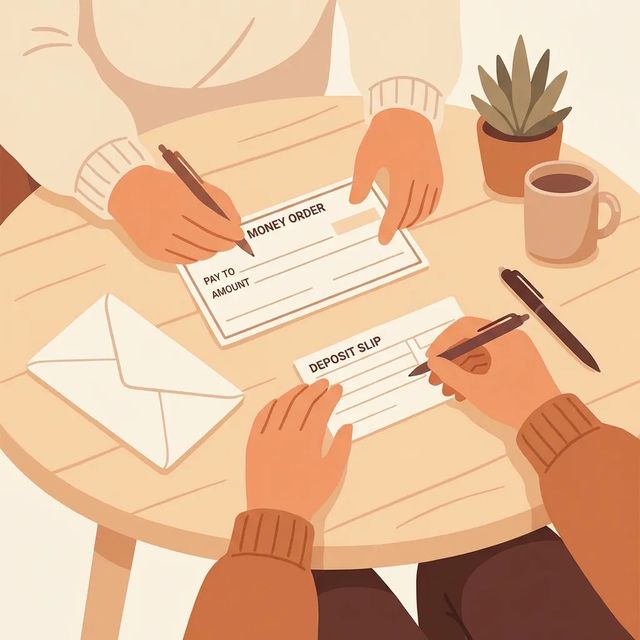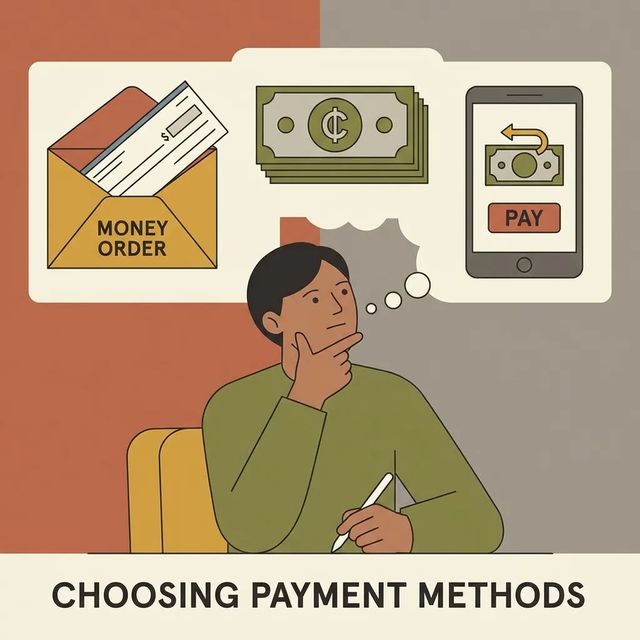Florida State Prison
Explore
Find an Inmate at Florida State Prison
Search for a loved one and send messages and photos in minutes.

Guides for This Facility

How to Get Approved to Visit Someone at Florida State Prison: Step-by-Step Application Walkthrough
Getting approved to visit Florida State Prison starts with one thing: a complete, properly signed application submitted the right way. Here's how to do it—and how to avoid the most common reasons applications get denied.
Read Guide
How to Send Money to Someone at Florida State Prison Using Money Orders
Sending a money order to someone at Florida State Prison is straightforward once you know JPay's requirements. Most problems come down to three things: not being on the approved list, missing contact info, or incomplete paperwork.
Read Guide
Sending Money to Someone at Florida State Prison: Money Order vs. JPay
Getting money to someone at Florida State Prison usually comes down to two options: mailing a money order or using JPay. Which one works best depends on what matters most to you—saving money, getting funds there faster, or keeping the process simple.
Read GuideAt a Glance
Visitation
- Do not visit until the inmate or facility notifies you that your visitation application has been approved.
- Persons 12 years old and older must complete the visitation application form to apply for visiting privileges.
- Only one visitation form is allowed per person and leaving required fields blank can cause denial of the application.
Communication
- In‑state calls under the North American Dialing Plan are charged at $0.135 per minute.
- Each incarcerated person receives one free phone call per week lasting up to five minutes under the contract.
- Individual phone calls may last up to 30 minutes and a 30‑minute waiting period applies after a completed call.
Mail & Letters
- Incoming correspondence is often classified as general (opened and inspected by staff) or legal/privileged (opened only in the inmate’s presence).
- Many facilities scan routine personal mail and deliver electronic copies via kiosks or tablets; originals are sometimes destroyed after a set retention period.
- Include the inmate’s full name, booking or ID number, and your return address on every item; missing details can cause mail to be rejected or returned.
Sending Money
- You must be on the inmate’s Approved Visitors List to send money via money order to Florida State Prison.
- Mailed money orders require a copy of the sender’s photo ID (driver’s license, state ID, or passport).
- The money order deposit form lists a maximum amount of $999.99 per money order.
Inmate Lookup
- Florida uses multiple inmate search tools run by different agencies; start with the state DOC for state-prison records.
- Entering the inmate's last and first name plus date of birth or booking number yields more accurate search results.
- Use booking date range and other filters to reduce unrelated matches when the search returns many results.
Contact Info
- Visitation applications for Florida State Prison should be submitted by email to VisitappFloridaSP@fdc.myflorida.com.
- For phone and video account support contact GTL ConnectNetwork at 866-732-9098 (available 24/7).
- Typical visiting hours are listed as Saturdays and Sundays 9:00 AM–3:00 PM and (Central time) 8:00 AM–2:00 PM.
Facility Info
- Normal visiting hours are typically Saturdays and Sundays 9:00 AM–3:00 PM and (Central time) 8:00 AM–2:00 PM.
- To submit a visitation application, email VisitappFloridaSP@fdc.myflorida.com.
- Only one visitation form is allowed per person and leaving required fields blank can cause denial of the application.
Based on official sources and community feedback. Learn how we verify
Topic Overviews
Visitation
Before visiting Florida State Prison, submit a completed visitation application and wait for approval—don't travel until you've been notified. Anyone 12 or older must fill out the form, and only one form per person is allowed. Leave required fields blank and your application may be denied; make sure Part 2 certification is included. Email applications to VisitappFloridaSP@fdc.myflorida.com. Expect searches upon arrival. Visitors 16 and older need a valid photo ID to enter the visiting area. Shirts and shoes are required—Heelys and shoes with removable parts aren't allowed. You can bring up to $50 in small bills for vending, necessary prescription meds in original containers, specified infant items, one vehicle key, and one photo ID.
Read full guideCommunication
Florida State Prison uses GTL/ConnectNetwork for phone service. Set up an AdvancePay prepaid account to fund calls from your loved one. In-state calls within the North American Dialing Plan cost $0.135 per minute. Each incarcerated person also gets one free 5-minute call per week. Calls are capped at 30 minutes, and there's a 30-minute wait before another call can be placed. Need help? GTL ConnectNetwork support is available 24/7 at 866-732-9098. When creating your account, make sure your first and last name match your government-issued ID.
Read full guideMail & Letters
Before mailing anything to Florida State Prison, double-check the current mailing address and any format or vendor requirements—policies can differ by facility. Incoming mail is typically sorted into general mail (opened and inspected by staff) and legal/privileged mail (usually opened only in the inmate's presence). Many facilities use digital mail programs that scan personal letters and deliver electronic copies via kiosk or tablet; originals may be destroyed after a retention period. To avoid delays or returns, write the inmate's full name and booking/ID number on every item and include your complete return address. Don't send irreplaceable originals—send copies instead. If you need an original returned, include clear instructions and a prepaid return envelope.
Sending Money
Florida State Prison accepts mailed money orders for inmate accounts, but you must be on the inmate's Approved Visitors List to send one. Include a copy of your photo ID (driver's license, state ID, or passport) with each money order, and complete the JPay deposit form when required. The form lists a maximum of $999.99 per money order. No JPay fee applies to money orders, cashier's checks, or certified bank drafts. Once JPay receives an approved money order, expect processing within ten (10) business days. Prefer not to mail funds? Other options include online portals, lobby kiosks, or phone deposits—follow vendor instructions and confirm details on the facility page before sending money.
Read full guideCommon Questions
Showing 6 of 21How do I apply to visit someone at Florida State Prison?
Complete the visitation application (required for anyone 12 and older) and include the Part 2 certification. Only one form is allowed per person, and leaving required fields blank can cause denial. Email it to VisitappFloridaSP@fdc.myflorida.com and wait for approval before going to the facility.
VisitationWhat ID and dress code are required to visit Florida State Prison?
If you’re 16 or older, you must bring a valid photo ID to enter the visiting area. Shirts and shoes are required, and Heelys and footwear with removable parts are not allowed. You can take in one photographic ID card and one vehicle key.
VisitationWhat can I bring with me to a visit at Florida State Prison?
You may bring up to $50 in cash ($1, $5, $10, and $20 bills) for vending; it must be used in the visiting area and can’t be given to inmates. Prescription medication is allowed only in the original container and only in the amount needed for the visit. If you’re visiting with an infant, you can bring limited baby items, and infant carriers are subject to search.
VisitationHow much do phone calls from Florida State Prison cost?
Calls within the North American Dialing Plan are billed at $0.135 per minute.
CommunicationDoes Florida State Prison provide any free calls?
Yes. Each incarcerated person gets one free phone call per week, lasting up to five minutes.
CommunicationHow do I set up an account to receive calls from Florida State Prison?
Create a GTL/ConnectNetwork account, and use AdvancePay if you want to fund prepaid calls. Your first and last name must match your government-issued ID. For help, call GTL ConnectNetwork at 866-732-9098 (24/7).
CommunicationMore Guides
Ready to Connect?
Search for your loved one to start communicating today
Did You Know?
Do not visit until the inmate notifies you that your visitation application has been approved.
This guide is based on feedback from dozens of families and official facility documentation. Learn how we verify
